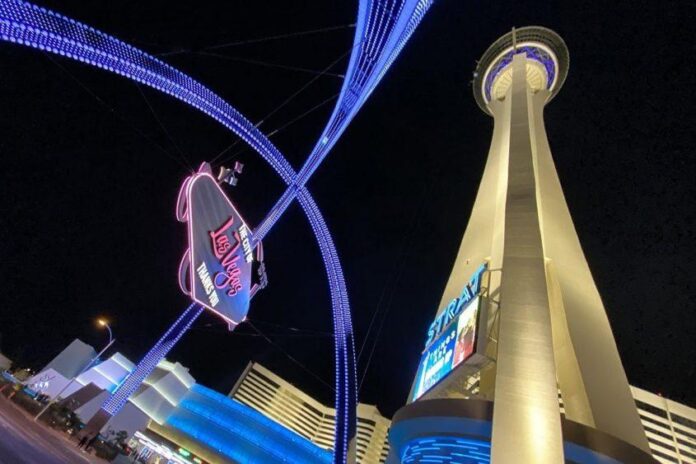Golden Entertainment’s Shift: A Dive into the Sale-Leaseback Deal with Vici
The Overview of the Deal
Golden Entertainment, Inc. is making headlines with its recent announcement about being acquired by its CEO, Blake Sartini, while entering a significant sale-leaseback transaction with Vici Properties Inc. This notable arrangement involves Vici purchasing the real estate of The Strat, along with two Arizona Charlie’s casinos located in Las Vegas. Although the news might seem mundane to the casual observer, delving deeper reveals a strategic pivot in the operations of Golden Entertainment amidst operational challenges.
Background on Golden Entertainment
Once a vibrant player in the casino scene, Golden Entertainment has faced increasing pressures. The company’s financial landscape has been marked by declining revenues, heightened margin pressures, and looming debt risk. They reported a drop in Q3 2025 revenue to $154.8 million from $161.2 million year-on-year, culminating in a net loss of $4.7 million. This drop contrasted sharply with the same period in the previous year when they enjoyed a net income of $5.2 million. Such figures paint a concerning picture, signaling the urgent need for a robust turnaround plan.
The Sale-Leaseback Strategy Explained
In essence, a sale-leaseback strategy enables a company to sell its real estate assets while simultaneously leasing them back, providing cash for operational flexibility. For Golden Entertainment, this means they can unbolt the capital tied up in their real estate, thereby amending their financial structure. Vici’s acquisition encompasses not just The Strat but also several local properties, totaling around $1.16 billion. The transaction aims to alleviate some of Golden’s burdens while simultaneously expanding Vici’s foothold in the Nevada market.
Vici’s Growing Portfolio
Vici Properties, a recognized REIT, has been increasingly establishing itself as a leading player in Las Vegas real estate. Following the deal, Vici will acquire seven of Golden’s properties, and the leaseback arrangement guarantees predictable long-term cash flows for the company. This strategic move allows Vici to diversify its portfolio, mitigating concerns over dependence on a single client, such as Caesars Entertainment, from which a large portion of its annual rent is derived.
Financial Components of the Deal
As part of this agreement, Vici will lease the casinos back to Sartini’s new operating entity, Golden OpCo. The financial structure features a 30-year triple-net master lease, where the initial annual rent is about $87 million, increasing by 2% annually beginning in the third year. This not only provides immediate cash flow relief for Golden but also secures a consistent revenue stream for Vici.
Golden’s Path Forward
Going private, as Golden plans, allows the company to navigate operational hurdles more flexibly. Reducing the public company reporting burdens could enable Sartini to respond swiftly to market shifts, enhancing the potential for future growth. Furthermore, with Vici committed to assuming up to $426 million of Golden’s outstanding debt as part of the deal, the restructuring will empower Golden to focus on its core operations.
The Bigger Picture in Las Vegas
The prevalence of REIT sale-leaseback deals in Las Vegas highlights a growing trend in the casino industry. Companies like Caesars and MGM may dominate the Strip, but it is Vici that truly owns much of the valuable real estate. This "asset-light" model is appealing in theory; however, the recent decline in Las Vegas tourism has exposed vulnerabilities in this strategy, leading to an irony: while casinos may own brands, it is their underlying physical assets that hold true value, particularly during downturns.
The Implications for Customers
For guests of The Strat and other properties involved in this transition, the alterations may feel invisible. Operationally, the functionalities remain the same, reflecting the business’s adaptability rather than its fundamental essence. Nevertheless, this shift signals broader implications for employees, stakeholders, and the Las Vegas market as it adapts to a fluctuating landscape.
Additional Notes on Leadership
Keeping in mind the familial connections within the industry, Blake Sartini is not merely a business figure but springs from a lineage of influential names in gambling, married to Delise Fertitta, daughter of Frank Fertitta Jr. This backdrop lends an additional layer of understanding to the strategic choices Sartini might pursue.
Looking Ahead
As the deal culminates in mid-2026, observers will be keenly watching how Golden Entertainment redefines its identity and operational practices. The move promises enhanced nimbleness but also raises questions about potential disruptions and the overall market’s resilience in upcoming years.
